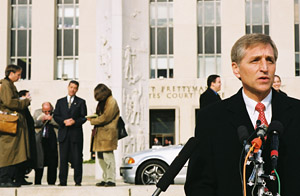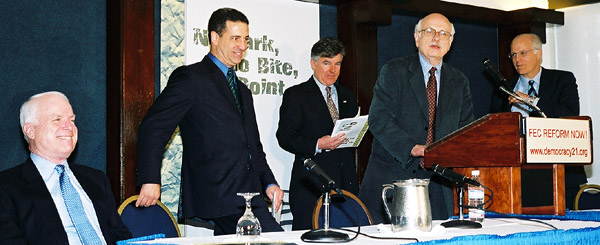McConnell v. FEC at:
Supreme Court of the United States
The Campaign and Media Legal Center
Stanford Law School
On March 21, 2002, the day after the Senate passed the bill, Sen. Mitch
McConnell, who termed the measure "unconstitutional" and an "assault"
on freedom of speech, announced the heavyweight legal team he has put together
to challenge the legislation--Floyd Abrams, Judge Kenneth Starr, James
Bopp, Bobby R. Burchfield, Jan Baran, and Dean Kathleen M. Sullivan.
The very day Bush signed the bill, McConnell filed suit in the U.S. District
Court for the District of Columbia. Suits by various other groups
were consolidated into McConnell v. FEC.
 |
| Dec. 4, 2002--During a break on the first day of oral arguments in McConnell v. FEC, RNC Chairman Marc Racicot (front) and Sen. Russ Feingold speak to reporters outside the U.S. District Court . [More Photos] |
On the rulemaking track, the Federal Election Commission began to gear up its rulemaking process in April 2002. On May 9, the FEC issued a first round of proposed rules to implement aspects of the Act; and over a year later they were still developing and finalizing rules related to the Act.
Despite passage of BCRA serious concerns remain over many aspects of how elections are financed in the United States, ranging from low public participation in the matching funds checkoff to the financing of the presidential nominating contests to the activities of Section 527 organizations.
